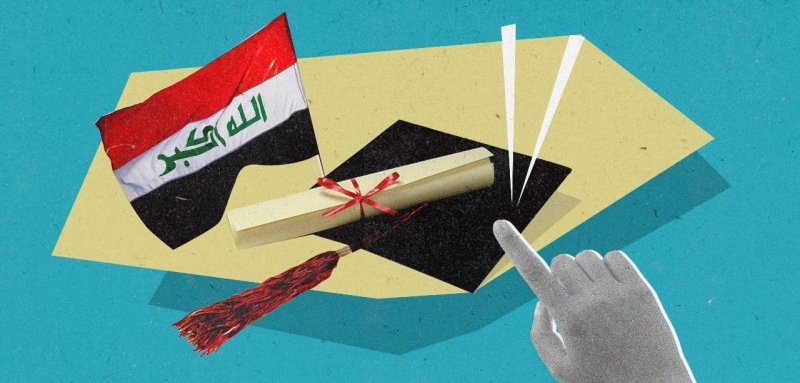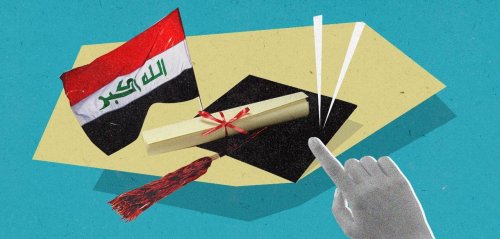In a statement reflecting the deterioration of education and rehabilitation of the labor market in the country, the Iraqi Parliamentary Education Committee revealed that 90% of the degrees obtained by graduate students outside Iraq since the US invasion in 2003 are fake or forged. The committee also pointed out that the local educational and teaching situation is headed for the worse.
In a statement to the Iraqi Al Sabaah newspaper, a member of the Parliamentary Committee, Riyadh Al-Masoudi, confirmed that 90% of the diplomas are foreign and were granted to graduate students from outside the country after “they obtained them through funds, remotely, and from unrecognized universities.”
A Miserable Educational Reality
While considering that Iraq suffering from a “tragic educational reality” is a product of “the period of wars that it has gone through for many years”, Al-Masoudi stressed that “the Coronavirus pandemic came to worsen the crisis in the country. This reflected negatively on the educational setting in schools and universities, and this is what will lead to the graduation of educationally weak generations.”
Warning against “educationally weak generations”, Iraq’s parliamentary Education Committee draws attention to the “tragic reality” since the US invasion, stressing that 90% of foreign degrees are fake or forged
What Al-Masoudi said is consistent with the latest data from the United Nations Children’s Fund (UNICEF), which affirms that “the (educational) infrastructure is in a state of crisis and ruin (due to wars)... because one in every two schools has been damaged and needs rehabilitation,” in addition to the severe shortage of qualified teachers at all levels of education. UNICEF blames successive Iraqi governments for only allocating less than 6% of the public budget to education over the past years.
A few days ago, the index of “quality education” of the Davos Forum (World Economic Forum) was announced. However, the list did not include the name of Iraq. The announcement sparked the anger of Iraqis. However, a statement by the Ministry of Higher Education and Scientific Research described that the index was issued by “non-specialists” and people that are not qualified, claiming that the global forum is primarily concerned with measuring economic indicators.
Relying on E-Learning and Reforming it
In the opinion of the parliamentary official, it is necessary to “prepare a strategy for both the Ministry of Education and the Ministry of Higher Education and Scientific Research to address the decline in the educational and teaching situation in light of COVID-19,” noting “the need for e-learning approved by the two ministries for special educational programs that are tailored to the Covid situation as well as remote education.”
This emphasis on the importance of relying on remote education came following repeated warnings from health experts of the danger of continuing physical school attendance in light of the high numbers of Covid cases and deaths. The latest warning was sounded just last week, when the Health Committee in the Iraqi Parliament demanded that the Ministry of Education prevent the situation from getting out of control in the event that physical attendance continues in schools.
Despite the tremendous devastation inflicted on the education sector in Iraq since the US invasion and the urgent need to establish thousands of schools and train teachers, Iraqi governments allocate this key sector about 6% of the yearly budget
The ministry had responded to the strong demand with the clarification that it is only committed to the decisions of the Higher Committee for Health and National Safety which is concerned with managing the pandemic throughout the nation.
In the meantime, Al-Masoudi warned that Iraq is heading to “educational and cultural obscurantism (or deliberately preventing information)”, given how “most countries” deal with the Covid crisis and mitigate its impact on education, blaming this on “the absence of educational strategies.”
While indicating that his committee is working on preparing solutions to e-learning problems, Al-Masoudi called for a speedy “study on the nature of exam questions, preparation of digital and e-curricula, as well as a review of the nature of tests performed by students in schools and universities, especially following the decrease in the outputs of the Education Ministry from the sixth junior secondary stage to universities.”
In his opinion, Iraq needs “about 10 thousand schools” and 10 universities, each containing a similar number of faculties, in order to “contain the outputs of the Ministry of Education and not direct them (students) towards private or night education.” Iraqi schools are currently operating with the multi-shift system. It is a system that has proven to be ineffective, with success rates in the period of early mornings, for example, at 92%, compared to just 72% in the evening period.
Raseef22 is a not for profit entity. Our focus is on quality journalism. Every contribution to the NasRaseef membership goes directly towards journalism production. We stand independent, not accepting corporate sponsorships, sponsored content or political funding.
Support our mission to keep Raseef22 available to all readers by clicking here!
Interested in writing with us? Check our pitch process here!




